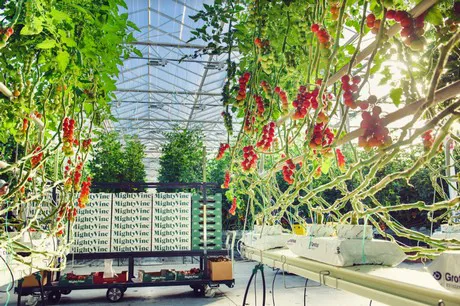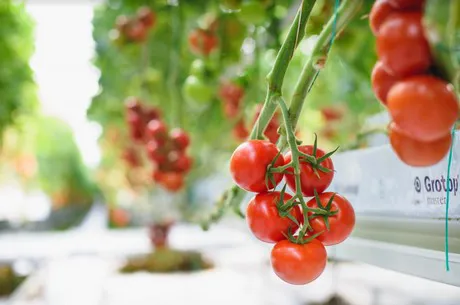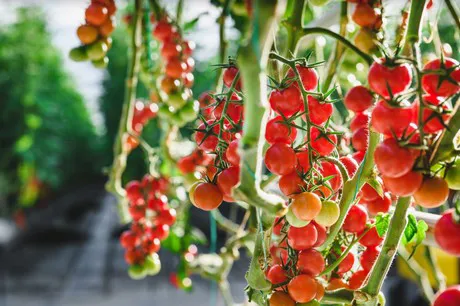MightyVine is doubling their greenhouse acreage from 15 to 30 acres. This expansion is driven by the growing demand for safe and locally grown produce. CEO Gary Lazarski explains how the company manages to serve both local outlets as well as bigger retailers in the area, and to grow their own brand identity.
It’s been only three years since the first tomato plants were put into the first MightyVine greenhouse, and just two years since the first expansion was opened. Now the Chicago greenhouse is doubling in size again: Two new greenhouses will be built, resulting in 30 acres of premium tomatoes.
MightyVine grows tomatoes on the vine, both regular and cherry. “The TOVs cover 80% of our acreage”, CEO Gary Lazarski explains. “We also grow other products for specific customers - Roterno, beefsteak or yellow beefsteaks for example.”
The varieties they cultivate, are based on customer feedback. “We don’t say yes to everything, but if a customer is committed to buying, we’ll plant for sure. Of course we look for a balance: growing various tomatoes makes things difficult, and we want to keep our focus on what we do best.
We grow fewer, but better, products.”
This focus on the customer and the quality is at the heart of the company, and has been since the start. “Compared to other greenhouse growers we are not the biggest, nor are we growing the fastest – even if you take our current expansion into account. We do not want to compete in the commodity market; we’re trying to build a brand established on quality, flavor and the local aspects. Therefore it is important to listen, to get to know the market.”
About that market
In the marketing of their products, MightyVine primarily serves two different outlets. Retailers take most of the produce, but local food service and restaurants aren’t less important to the grower. “Restaurants are not the biggest customers in terms of quantity, but they are definitely important when it’s about building the brand and the association. By now we even see our own brand on menus in town, such as a Mighty Vine Caprese Salad. That’s the business: we know we are on the right track and they help us build a local brand. Making a tomato that the restaurant chefs in Chicago, being one of the great food cities in the world, would appreciate and would ask for by name has always been a focus point.”
To serve these outlets, MightyVine has a marketing agreement with Local Foods, a distributor selling a range of produce to restaurants and retailers in Chicago. “Our sales team focuses on larger retail opportunities. Going to all these smaller restaurants wouldn’t make sense for ourselves – but thanks to Local Foods we can serve them as well.”
Big retailers
A second important marketing agreement is the one with Robinson Fresh, part of CH Robinson. While Local Foods helps in connecting to local restaurants and retailers, Robinson Fresh is a wholesaler to the larger retailers. “For a small farm like us it’s hard to get the attention of big companies, retailers”, says Lazarski. “Robinson Fresh got us in and continuously guides us through.”
Serving big retailers
So what are the most important topics when it comes to serving big retailers? To consumers, the origin of the produce is becoming increasingly important. “Consumers want fresh, local produce, and they’re also willing to pay for it”, Gary knows. “Historically there haven’t been such produce farmers in the Mid-West and our labor costs for example can’t compete with the ones in Mexico. But for a slight increase in price, a big increase in quality is realized, and consumers see the difference. It turns out people are willing to spend that extra dollar a pound for a product that looks fresh and red, is grown local and, most important, tastes great. That’s what makes customers return to a store.”
And retailers, as big as they are, are also savvy: they want to fulfill this demand and their consumers’ wishes. “They rely on you: week after week. They want customers to be able to come in and see all the products on the shelf for a consistent price and quality. Therefore you have to be able to fill their demand, deliver on time and meet the specs you’ve established. Week after week. That’s an important topic.”
Doing this results in a growing business to Mightyvine. And so the expansion is the direct proof of the company’s vision. “We’re not trying just to expand or build the largest greenhouse we can finance and worry about the sales later. We want to grow at a size that allows us to maintain our high quality. The process of doubling is in response to the market demand. To me, that’s the sustainable way of growing.”
For more information:
MightyVine
(+1) 312-432-6568






